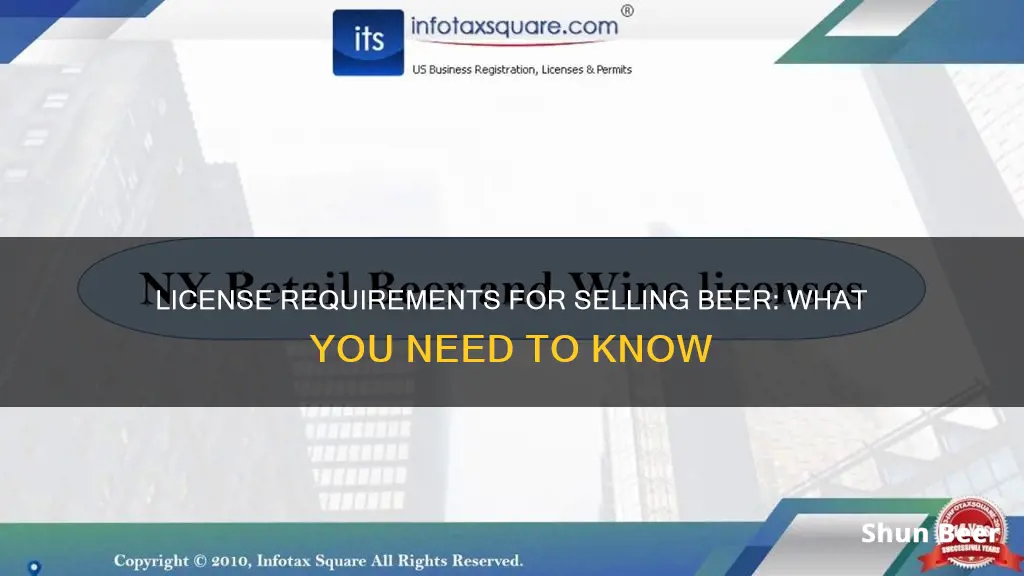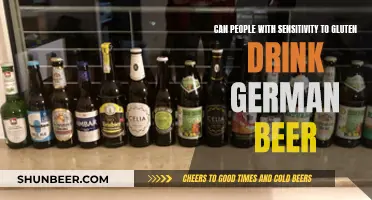
If you're thinking of selling beer, you'll need to get clued up on liquor licensing laws. The short answer is yes, you will need a license to sell beer, but the specific type of license you need will depend on your business. The primary purpose of liquor licenses is to regulate and control the sale of alcohol to promote responsible business practices and compliance with the law. Without the right license, you could face steep fines or even criminal charges.
The laws around liquor licensing are complex and vary depending on your state and locality, so it's important to do your research. There are different types of licenses for on-site consumption, off-site consumption, manufacturing, and wholesale. There may also be additional requirements and restrictions, such as age restrictions, background checks, and financial obligations.
It's also worth noting that some states require servers and bartenders to have individual licenses or certifications to serve alcohol.
Before starting any beer-selling business, be sure to consult the relevant authorities and, if necessary, an alcohol licensing lawyer, to ensure you have all the necessary permits and licenses.
| Characteristics | Values |
|---|---|
| Do I need a license? | Yes |
| What type of license? | Liquor license |
| Who issues the license? | State Liquor Authority |
| Who needs a license? | Businesses selling alcoholic beverages |
| Who doesn't need a license? | Businesses allowing BYOB, businesses giving away alcohol for free |
| What are the types of licenses? | On-premises, off-premises, manufacturing, wholesale |
| What is the cost of a license? | Varies depending on the state and license type |
| What are the requirements for a license? | Age restrictions, background checks, financial obligations |
| What are the penalties for selling without a license? | Fines, business closure, criminal charges |
What You'll Learn

On-sale vs. off-sale licenses
On-sale licenses allow businesses to sell alcoholic drinks for consumption on the licensed premises, such as at restaurants, bars, and hotels. This includes the sale of beer, wine, and distilled spirits, as well as beer and wine only.
On the other hand, off-sale licenses enable retail stores to sell prepackaged beer, wine, and liquor for consumption off-site. This type of license is typically held by liquor stores, grocery stores, and convenience stores. Off-sale licenses are generally less expensive than on-sale licenses, as they do not allow for on-site consumption.
The specific requirements and restrictions for on-sale and off-sale licenses may vary by state and locality. For example, in California, there are different types of on-sale and off-sale licenses, such as the Type 47 license for restaurants serving alcohol with food, and the Type 20 license for off-sale beer and wine sales.
It is important to note that the process of obtaining a liquor license can be lengthy and expensive, and the competition for licenses varies based on the type and location of the business. In California, each county limits the maximum number of liquor licenses that can be issued. Therefore, it is advisable to consult with an alcohol licensing lawyer or a brokerage service to navigate the complex process of obtaining the appropriate license for your business.
Beer and Stomach Flu: A Safe Mix?
You may want to see also

State-specific requirements
The requirements for selling beer vary from state to state in the US. Here is a list of state-specific requirements for selling beer, focusing on the need for a license:
Alabama
To obtain a liquor license in Alabama, you must contact and schedule an appointment with the Alabama Alcoholic Beverage Control (ABC) licensing division office for your county. Before your appointment, complete the pre-application packet and application checklist, which details all the documents you must bring to the appointment, including:
- Pre-application form
- Limited liability company (LLC) or corporation paperwork
- Identification documents
- Property details such as a lease or deed
- State and federal tax information
- Approval from your local governing authority
- Liquor liability insurance certification
The cost of Alabama liquor licenses ranges from $100 to $1,000, and they must be renewed annually from June 1 to July 31, as all liquor licenses automatically expire on September 30 each year.
Alaska
The process of obtaining a liquor license in Alaska can take three to six months, involving approval from the ABC board, local government, and other state agencies. Applicants must submit the documents outlined in the New or Transfer Liquor License Application Checklist, including a notarized and signed publisher's affidavit, background check documents, proof of the right to use the premises, and entity documents. Additional permits may be required for specific license types, such as restaurants, dispensaries, and recreational sites.
The cost of a liquor license in Alaska ranges from $50 to $2,500 and must be renewed every two years.
Arizona
To obtain a liquor license in Arizona, you must go through the Arizona Department of Liquor Licenses and Control. The application process can take between 75 to 105 days, and it is crucial to ensure that your application is thoroughly filled out. Certain requirements and restrictions may apply based on the county, city, or town of your business. For example, if your business is within 300 feet of a church or school, the state will not issue a liquor license.
The fees for liquor licenses in Arizona vary; for instance, a person-to-person transfer fee is $100.
Arkansas
The Arkansas Department of Finance and Administration's Alcohol Beverage Control Division office regulates liquor licenses in the state. Arkansas has several liquor license categories based on business type, and applicants must determine which category they fall under. There are six different liquor license types available:
- Combination of beer and wine
- Small farm wine, retail
- Hotel, motel, or restaurant mixed drink
In addition to the liquor license application, applicants must complete an entertainment form and undergo an ABC educational seminar and a criminal background check. The cost of an Arkansas liquor license ranges from $100 to $3,000, which is paid at the time of application submission.
California
California sets quotas for liquor licenses, making them expensive. For an on-sale restaurant permit, the application fee is $6,570. To obtain a new license, applicants must pay for a priority application, which costs $17,335. The annual fee for an "on-sale general" restaurant permit is $1,355 for a high-density population area, as of September 2023. The renewal fee is lower in areas with smaller populations.
California has strict regulations regarding the location of businesses selling liquor. For instance, you cannot obtain a license if your business is near churches, hospitals, schools, or public playgrounds. Additionally, you must prove that your business will not disturb residents if it is within 100 feet of a home.
Colorado
To apply for a new liquor license or transfer an existing one in Colorado, you must complete the Colorado Liquor Retail License Application. The process involves several steps:
- Determining the type of liquor license required, such as Tavern, Fermented Malt Beverage License, or Brew Pub license.
- Obtaining a Zone User Permit to use the building or land for the intended purpose.
- Gathering required documents, such as a City Tax license, floor plan drawing, and Tax Check Authorization.
- Paying state and city fees, which typically start at around $1,000.
- Scheduling a public hearing once all other requirements have been met.
- Undergoing various inspections, including by the Denver Fire Department and the Department of Public Health and Environment.
Connecticut
The Connecticut liquor license application process is extensive and should be undertaken well in advance. Applicants must first settle their building location, as the state considers both the liquor license applicant and the location where the liquor will be sold. The application must be posted throughout the city or town, and any resident can object, potentially stalling the process.
A comprehensive background check and a thorough inspection of the premises are also part of the process. Some applicants opt to seek legal assistance due to the documentation required.
Delaware
Delaware's Office of the Delaware Alcoholic Beverage Control Commissioner (OABCC) handles all liquor license processing for the state. The fees are relatively straightforward, but they must be paid again every two years when the license is renewed.
The application process in Delaware focuses on how you plan to handle liquor purchase and distribution. Having a detailed business plan before applying is essential. The time frame for receiving a response to a liquor license request in Delaware can be up to two months.
Florida
Florida's liquor laws are governed by the Division of Alcoholic Beverages and Tobacco (ABT), a subsidiary of the Department of Business and Professional Regulation. Florida dispenses liquor licenses by quota and without restriction.
If you want to sell only beer or beer and wine, you can apply for a consumption-on-premise (COP) license, with fees ranging from $56 to $392 depending on whether you include wine and the county population.
For restaurant owners who want to serve liquor, a Full Restaurant/SRX License can be obtained if certain criteria are met, such as having at least 51% of revenue from food sales. These licenses cost between $624 and $1,820, depending on the county population.
For bar owners wishing to sell liquor, a quota license must be purchased from a license holder, or you can enter the quota license lottery drawing. These licenses can be expensive due to scarcity, ranging from $50,000 to upwards of $750,000.
Georgia
To obtain a Georgia State Liquor License, you must apply at the local, state, and federal levels. At the local level, there are investigations into your business interests, and the municipal government approves your license. The cost at this level can be anywhere from $3,500 to upwards of $9,000 in Atlanta.
At the state level, there are four types of licenses to choose from: manufacturers, wholesale distributors, retailers, or special events. The state has a straightforward schedule of fees, with a license for a brewery costing $1,000, plus a $100 investigation/background check fee.
After obtaining the state license, you will need a Federal Basic Permit, which is free of charge.
Hawaii
The process of acquiring a liquor license in Hawaii is highly regulated and may take three months or longer. The application procedure varies depending on the county, and each county has its own required checklist for documentation, notarization, permits, identification documents, criminal background review, premises information, and application fees.
Hawaii offers different liquor licenses distinguished by classification, kind, and category:
- Classification: Examples include restaurant, manufacturer, retail, club, cruise, cabaret, hotel, brewpub, and hotel, each with permitted activities.
- Kind: The specific type of alcohol served, such as liquor, beer, wine, or a combination.
- Category: For restaurant, cabaret, and dispenser classifications, the category defines the permitted activities, such as music and dancing.
The cost of a liquor license in Hawaii depends on its kind and class, ranging from $150 to $1,200, and licenses must be renewed annually.
Idaho
Idaho instituted a quota system for liquor-by-the-drink licenses in 1959, limiting the number of licenses based on population. Each incorporated city is allowed two liquor licenses, with the possibility of additional licenses as the population grows. There are waiting lists for licenses in over 70 cities, and a secondary market has developed, with prices reaching over $100,000 in Boise.
The application process involves submitting a completed application, property lease agreement or proof of ownership, health department inspection, and accompanying documentation to the Alcohol Beverage Control Bureau. Annual license renewal is required.
Illinois
To obtain an Illinois state liquor license, you must first obtain a license from the municipality where your establishment is located. The Illinois Liquor Control Commission (ILCC) offers various permits, including for regular retailers, special use, and craft distilleries. The ILCC has strict qualifying criteria, requiring ownership information, sales tax history, Federal Employer Identification Number (FEIN), and local liquor license.
There are no liquor license quotas in Illinois, so a Retailer permit costs $750. Other permits, such as a Specialty Retailer permit, have varying costs. Brewpubs are charged $1,500, while winemaker retailers and caterer retailers pay $500.
Iowa
In Iowa, the Alcoholic Beverages Division (ABD) governs the issuance and renewal of liquor licenses. Applicants must meet specific requirements to prove their "good moral character," including no felony convictions for five consecutive years, U.S. citizenship, state residency, and no connection with a revoked liquor license in the previous two years. Financial and reputational standing must also be demonstrated.
For selling liquor in Iowa, you must show ownership of the premises and ensure the building meets all local, state, and related requirements, including seating for at least 25 people.
Kansas
Kansas typically responds to liquor license applications within a 30-day window. To obtain a license, you must be a U.S. citizen, a state resident, have a Federal Employer Identification Number (FEIN), and hold an active tax clearance certificate. Registration with the state's Department of Revenue is also required before submitting your application and payments.
The Kansas liquor license application offers various licensing options with associated fees. You may need to do some research to understand which situation applies to your business.
Kentucky
Kentucky has an online application process, streamlining the submission of documents. Payments are made through an encrypted portal, providing convenience and security. However, Kentucky has liquor license quotas, and both state and local liquor licenses may be necessary for some municipalities. The ABC website provides a tool to search for license availability.
General criteria for applying for a liquor license in Kentucky include:
- Being at least 21 years old.
- Being a U.S. citizen or naturalized citizen.
- Being a state resident for at least 12 months.
- Having a clear felony record for at least five years.
- Having no alcohol-related misdemeanor record for at least two years.
You can expect a response to your application within 60 days.
Louisiana
Streamlining the process of getting approved to sell alcohol in Louisiana can be done by purchasing an establishment that already holds an active liquor license and notifying the state's Office of Tobacco and Alcohol (OTA) within five days of closing on the establishment.
If applying for a new license, various applications are available for bars, restaurants, and microbrewing-related locations. The application process typically takes about five weeks, and required documentation includes Schedule As and Fs, lease agreements, fingerprint cards, and proper IDs.
You must run an advertisement in an acceptable publication to announce your intent to apply for a liquor-selling permit before submitting your application.
Maine
To obtain a liquor license in Maine, you will work with the Maine Bureau of Alcoholic Beverage and Lottery Operations. On-premises liquor licenses are approved at the local level, not by the state. Depending on the municipality, you may need to run an advertisement and hold a hearing.
A background investigation and a thorough inspection of the premises are part of the process. The Maine application is quite lengthy, and several permits and identifying documents are required before applying, such as a health license, shellfish license, dance license, and victualer's license.
Fees for liquor licenses in Maine vary depending on the license class.
Maryland
There are three ways to obtain a liquor license in Maryland: expansion, transfer, or new license application. State law requires posting a notice on your property explaining the change, such as transfer of ownership or expansion, for 10 days. Additionally, you must advertise the change in local newspapers to inform the community.
The application fee, which includes the hearing fee, is $600. The application process also involves submitting various documents, such as a floor plan diagram, financial forms, certificate of incorporation, and proof of payment from zoning.
Massachusetts
The liquor license application process in Massachusetts is regulated by the Alcoholic Beverages Control Commission (ABCC). The steps include submitting the application, paying a $200 fee, and notifying residences and nearby properties about your application. Proposed managers must also provide their contact information.
Michigan
Michigan has quota requirements for liquor licenses based on population. The state typically issues one liquor license per 3,000 people but may waive this requirement in certain cases.
The required documents depend on the type of liquor license applied for. For a New Class C, Tavern, B-Hotel, or A-Hotel License, you will need a Livescan Fingerprint Background Request, property documents, inspection, license/permit fees, and a Local Government Unit Approval Form. Additional forms and requirements may apply for corporations or limited liability businesses.
The Commission reviews the application, financial information, and any arrest records before approving or denying the request. If approved, the Licensing Unit issues the license documents. An appeal process is available for denied applications.
Minnesota
To sell alcohol in Minnesota, you must obtain an on-site or off-site liquor license depending on your business activities. Retailers should apply for an off-sale license, while on-site licenses are required for businesses like restaurants, hotels, sports facilities, entertainment venues, and clubs.
The application process starts with obtaining approval from the local government. License applications require a sheriff or local police signature, and county-issued licenses need a county attorney signature.
Various license types are available, including Municipal, Wine, and Combination Licenses. The state application requires business and building information, business tax identification, and details of activities and food provided on the premises. Applications are submitted to the Alcohol and Gambling Enforcement Division of the Minnesota Department of Public Safety, and a public hearing may be required.
Licensing fees vary by the size and location of the establishment and must be renewed annually.
Mississippi
To obtain a liquor license in Mississippi, you must first give public notice of your intent by advertising in two consecutive issues of a newspaper circulated in your business location's city or town.
The application process involves submitting the permit issued by the State of Mississippi Department of Revenue, along with ownership information, financial statements, lease or deed information, a detailed floor plan, a menu (if applicable), and various other documents.
The type of permit and licensing fees depend on your business activities, ranging from $45 to $9,025. Applications are submitted to the Alcoholic Beverage Control Division.
Missouri
In Missouri, all restaurants, bars, hotels, and package stores must have a valid liquor license to sell alcoholic beverages. The application process is straightforward, but if your business is within 300 feet of a school or church, obtaining a license may be challenging. You will need the approval and written consent of the majority of the school or church board members, and local issues like neighborhood votes or city council decisions can impact the process.
Missouri has different license types, including for retailers, caterers, drinking establishments, and non-profit organizations. The application process involves determining the license type, identifying the district, contacting the district agent, and submitting the application and fee. The fee varies depending on the district.
Montana
Montana regulates alcohol sales by different categories: distributors, producers, and retailers. Before applying, you must determine which license category applies to your business needs. Various license types are available, such as beer and wine wholesaler, distributor, and importer licenses, and brewery, winery, and distillery licenses.
To apply for a new alcoholic beverage license, complete Montana's alcoholic beverage authorization and other required forms, including fingerprint cards. The license fee ranges from $400 to $800, plus a $400 application processing fee.
Montana uses a competitive bidding process for individuals and businesses to bid on the opportunity to apply for an available license, requiring a letter of credit, a $100 fee, and a minimum bid of 75% of the market value.
Nebraska
To apply for a liquor license in Nebraska, you must contact the state's Liquor Control Commission (NLCC) for application materials. The application process involves submitting the provided application, personal identification forms, fingerprint forms, limited liability verification, and operating permits. There is a $400 non-refundable application processing fee, and additional costs vary depending on the license type. Applications are typically processed within 60 days.
As part of the process, a public hearing is scheduled, and specific submissions must be prepared and submitted to the County Board, including a list of property owners within 500 feet of your establishment and proof of written notice to these property owners.
Nevada
Obtaining a liquor license in Nevada can be expensive, with origination fees reaching upwards of $40,000 for restaurants in Las Vegas that want to sell liquor on-premises. The application process is straightforward, but it's important to have all the required information, such as owners' and responsible parties' details, federal permits (if applicable), and disclosure of any alcohol-related violations.
Nevada handles liquor licenses on a very local level, so in addition to submitting the application and Business Registration paperwork to the state, you must also submit it to the correct local governing entity.
New Hampshire
New Hampshire has a digital application process, providing a secure and streamlined experience. Multiple stages are involved, including submitting a request for an application, working with the Liquor Commission Division of Enforcement, undergoing a site inspection, and arranging a meeting with the Licensing Help Desk. Fees apply based on the license granted.
New Jersey
New Jersey has three types of liquor licenses: retail, wholesale, and manufacturing. The
Beer After Dinner: A Healthy Choice?
You may want to see also

Federal licenses
The TTB divides alcohol businesses into four categories:
- Alcohol producers and manufacturers (breweries, distilleries, wineries)
- Alcohol importers, wholesalers, and exporters
- Alcohol users and dealers
The TTB offers an online tutorial to help you figure out the permits you need. Once you know which permits to apply for, you can file the appropriate application(s) with the TTB. Most applications can be filed online. Obtaining a federal license is necessary before you start producing alcoholic beverages, and it is also required to apply for a state permit.
In addition to federal licenses, you will also need to obtain state and local licenses to sell beer drinks. The requirements for these licenses vary depending on your business location and activities.
Beer Left Out: Still Safe to Drink?
You may want to see also

Local licenses
The On-Sale Beer and Wine license permits the sale of all types of wine and malt beverages, including beer, porter, ale, stout, and malt liquor, both for consumption on and off the premises. This means that customers can purchase drinks to enjoy at the licensed establishment or take away.
The Off-Sale Beer and Wine license, on the other hand, only authorizes the sale of wine and malt beverages in their original, sealed containers for off-premises consumption. This type of license is suitable for businesses that want to sell alcoholic drinks for customers to enjoy elsewhere, such as liquor stores or shops.
The On-Sale Beer license is specific to the sale of malt beverages, which can be consumed both on and off the premises. This license is more limited in scope than the previous two, focusing solely on malt-based drinks.
Other states, like Pennsylvania, have different classifications for liquor licenses. For instance, there is the "R" license for establishments primarily focused on food service, where the sale of liquor, wine, or beer is secondary. These include bars, taverns, and dining operations. The "E" license is for places like delicatessens or corner stores, where only beer and its variants can be sold, with liquor and wine sales forbidden.
Additionally, the licensing process may involve multiple levels of government. For instance, in Minnesota, Vine Park Brewing Co. had to obtain a federal license, followed by a state license, and then a city license. This highlights the need to navigate different regulatory bodies and their unique requirements when obtaining local licenses.
The cost and complexity of obtaining local licenses can vary significantly. While some business owners may find the process intimidating due to the extensive paperwork, others have shared that it is manageable as long as one follows the correct procedures and stays organized.
Germans and Their Beer: Warm or Cold?
You may want to see also

Permit types
The type of permit you need depends on the type of business you run and the kind of alcohol you want to sell. Here are some of the most common types of permits:
- On-sale licenses allow businesses to sell alcoholic drinks for consumption on the premises, such as at restaurants, bars, hotels, etc.
- Off-sale licenses enable retail stores to sell pre-packaged alcoholic beverages for consumption off-site. This is the type of license that most liquor stores require.
- Catering permits are special short-term permits that allow businesses to serve alcohol at private events.
- Restaurant license or all liquor license allows restaurants to sell beer, wine, or hard liquor. There is no limit on the kinds of alcohol that can be served under this license, but the earnings from alcohol consumption must stay under a certain percentage of the overall revenue, which varies by state.
- Beer and wine license is for establishments that don't need to serve hard liquor or spirits. Some permits for beer and wine also include hard cider and are often less expensive than full-service licenses.
- Tavern license is for bars or restaurants that make 50% or more of their revenue from alcohol sales.
- Brewpub licenses are for food service establishments that make alcohol, such as wineries and distilleries. If you have one of these permits, you may have to follow a rule that prohibits you from brewing and serving at the same time.
- Club licenses are for members-only clubs, such as country clubs. Some private organizations may only serve beer and wine, while others can serve hard liquor as well.
- Hotel licenses are for hotels with bars or restaurants that serve alcohol.
In addition to these common types of permits, there are also some specialty permits that may be required, depending on the state. These include:
- Manufacturing licenses for breweries, wineries, distilleries, cideries, and meaderies.
- Wholesale licenses for beer wholesalers, wine wholesalers, and importers.
- Local cartage permits that authorise the delivery of alcoholic beverages to consumers.
- Late-hour permits that allow businesses to stay open after midnight.
- Temporary permits that allow new applicants to serve alcohol while their license application is being processed.
The Amish and Alcohol: A Complex Relationship
You may want to see also
Frequently asked questions
Yes, with few exceptions, any business selling alcoholic beverages like beer must have the proper liquor licensing in place. A liquor license is an official certification from your state or local licensing board that permits you to sell alcoholic drinks.
There are four main groups of liquor licenses: on-premises licenses (e.g. bars, restaurants, hotels), off-premises licenses (e.g. liquor stores, grocery stores), manufacturing licenses (e.g. breweries, wineries), and wholesale licenses (e.g. beer wholesalers, wine importers).
The process for obtaining a liquor license will depend on your state and local laws. In general, you will need to meet baseline requirements such as age restrictions, pass background checks, and pay financial obligations.







